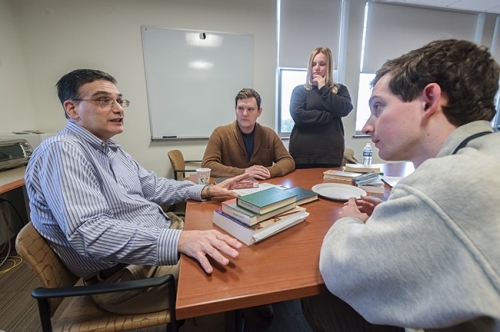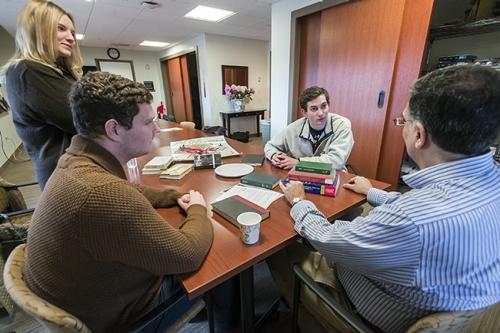Sean MacDonald (left) with fellow Fulton Debating Society members (L-R): Harrison Kenner, Jenna Bilak, Naveen Senthilkumar and Kelvin Lin during their visit to MCI-Norfolk.
The five Boston College Fulton Debating Society members had emptied their pockets, put their valuables into secured lockers, passed through metal detectors, and entered what to senior Naveen Senthilkumar seemed like “an air lock” – a small chamber with another door in front of them.
“And then the big metal door behind us clanked shut, and we couldn’t hear anything,” recalled Senthilkumar.
Up until then, the impending visit to the Massachusetts Correctional Institution at Norfolk had seemed like “just another debate” to Senthilkumar and his Fulton teammates. But by the time the BC undergraduates, along with Director of Debate John Katsulas, entered this passageway, the fact that they were in a medium-security prison suddenly “seemed very real,” he said.
Yet within a matter of minutes, the BC visitors were in the prison auditorium and things seemed familiar again: At the front of the room was a podium and tables, one for the Fulton team and the other for their opponents that day – a team of MCI-Norfolk prisoners that had invited the students to come debate them, and now warmly greeted their guests. Just like any other debate.
Listen to a feature on the Boston College-Norfolk Prison debate on National Public Radio.
On that day, Dec. 3, the Fulton Debating Society would lose narrowly to the Norfolk Prison Debating Society on the question of whether the U.S. should impose a carbon tax on greenhouse gas emissions. But the outcome of the event went well beyond points for analysis, reasoning, rebuttal and other elements of debate. For the Norfolk prisoners, it represented the revival of a hallowed tradition that began in 1933, but also a much-needed intellectual and social activity.
The BC students, meanwhile, found themselves contemplating questions of crime, punishment and redemption, while gaining added appreciation for their extracurricular interest.
“I came away with a sense of debate as a great equalizer,” said Sean MacDonald ’17. “We were in this place unlike any we’d ever been, and with people whose lives were very different than ours. But once you’re in a debate, all that matters is the rhetorical back-and-forth.”
“Contestation doesn’t require a degree,” said junior Harrison Kenner. “Anyone can participate in debate and find it rewarding – it’s a passionate, unique experience. I’ll definitely remember this particular debate and speak highly of it in the future.”

It began last summer with a hand-written note to Katsulas, an invitation from one of the inmates to the Fulton team to come debate at the prison. Katsulas, who as a college undergraduate had been part of a team that debated prisoners in MCI-Walpole, felt such an event would be mutually beneficial.
“For the prisoners, it’s an outlet to improve their communication skills,” he said. “For the students, this is definitely a window on a kind of life they had never seen and could never imagine.”
The Norfolk debate program also had a distinguished pedigree. Over the three decades following its creation, the Norfolk Prison Debating Society competed on the academic circuit against students from Harvard, MIT, Princeton and even defeated Oxford University in 1959. The Norfolk team – among its members was Malcolm Little, later to be known as Malcolm X – compiled a 144-8 record by 1966. But such activities fell by the wayside as prisons adopted a more restrictive management philosophy.
MCI-Norfolk Director of Treatment Bruce Pires said the prison where he worked previously had established a popular debate program, and when he transferred to Norfolk two years ago he found a groundswell of support (including from inmates he’d known at his previous stop) for restarting the prison’s hallowed team.
“From what I’d seen, debate was something from which everyone could learn – not just the team, but other prisoners and even prison officials,” he said. “I knew what it meant to the guys here, with all the tradition and history, so it just seemed like a good idea.”
Once the debate program was revived, the Norfolk team wanted to test its mettle against outside competition, and found that Fulton most closely matched its favored style of debate. After receiving the invitation, Katsulas contacted the Fulton students and they agreed to accept.
“I came away with a sense of debate as a great equalizer. We were in this place unlike any we’d ever been, and with people whose lives were very different than ours. But once you’re in a debate, all that matters is the rhetorical back-and-forth.”—Sean MacDonald ’17
The Fulton team – which argued against the carbon tax – prepared for the visit to Norfolk much as it would any debate, but also received some important instructions: Wear casual attire (but no sneakers). If you’re female, dress modestly. Don’t take too much with you, since you’ll have to store it. And don’t ask the prisoners about why they’re there.
As it turned out, the interaction with the inmates was brief and limited, but very hospitable. The Norfolk team presented Katsulas and the students with a signed poster commemorating the event, and thanked them warmly for coming.
“They were very nice,” said Senthilkumar. “They could have been our neighbors.”
But the BC visitors were nonetheless impressed by the inmates’ preparation, especially given their limited access to information sources and reliance on family members and friends to supply them with research material.
Once the debate was in progress, it was apparent that the Norfolk team’s debate style differed from that of Fulton – BC’s was policy-oriented, while Norfolk relied more on rhetoric and empathy with the audience, which consisted of other inmates as well as some prison officials (one Norfolk debater came to the podium wearing a surgical mask to underscore concerns about emissions).
“They did an excellent job connecting with the crowd,” said MacDonald. “Their presentations created a visceral audience response, and that can mean a lot.”
So after the result was announced – Norfolk over Fulton by a mere 0.6 points – the Fulton debaters were quick to congratulate their opponents.
“When I shook hands with them, I asked if they were interested in having a debate next year,” said Kenner.

But once back at BC, the students had a different kind of debate, one that took place inside themselves: How to reconcile the intelligent, well-spoken, engaging men on the Norfolk team with the violent crimes for which they were imprisoned?
“I struggled with that,” said Senthilkumar, who added that the experience had given him a new insight into the need for policies for criminal reform. “I thought, ‘What they did shouldn’t change my impression,’ but it was hard to accept that. Hopefully, there is a chance to redeem themselves, and so programs like debate are very valuable because they encourage inmates to use their intellectual and interactive skills.”
“Some of them had committed these unforgivable crimes when they were young, many years ago,” said Jenna Bilak ’19. “Are they that same person now? It’s hard to say, of course – I only got to know them as my opponents.”
“Whatever their crimes, they are people in the end,” said sophomore Kelvin Lin. “Their crimes don’t detract from that.”
Katsulas and the students hope there could be a regular – maybe an annual – Norfolk-Fulton debate. They also would like to assist the inmates with their research, perhaps even serve as volunteer judges at their debates.
Pires said he also hopes for a continuing relationship between the two teams – and that he understands the students’ conflicting emotions.
“The reality is that all the men here were still convicted of crimes, and one-third of them are in here for the rest of their lives,” he said. “Some, however, will be back out in the community. The guys who are involved in the debate program are exceptionally smart, they study very hard and apply themselves. It’s something they don’t take for granted.
“That can be a big revelation for students: They see how these men are making the most of every moment, and perhaps this encourages them to take their education more seriously.”
—Sean Smith / University Communications




